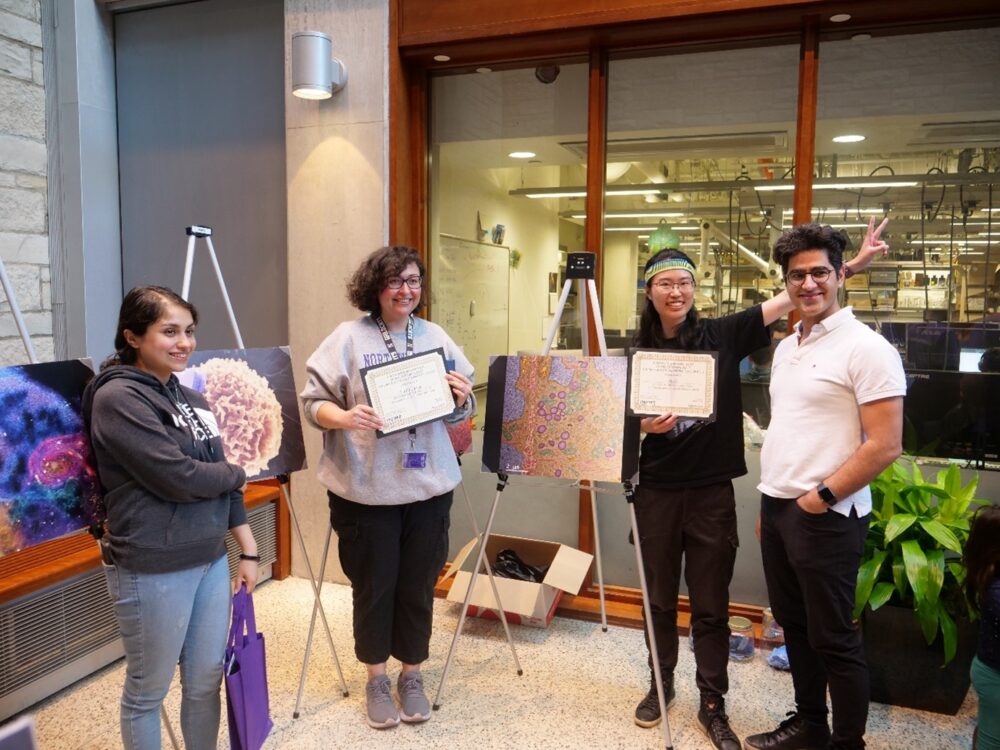Dr. Vuslat Juska: Bridging Diagnostics and Interfaces in Brain Science Fellowship
Posted: 15 May, 2025

At the heart of my project lies the development of a molecular pendulum-based microsensing platform designed to detect Alzheimer’s disease biomarkers with high specificity. The outgoing phase of my DOROTHY MSCA Fellowship has been a transformative period in this research journey, which began with the goal of developing diagnostics for Alzheimer’s disease and gradually expanded into the dynamic and evolving world of brain inflammation research.
During my research stay at the Kelley Lab at Northwestern University, I was awarded 3rd place in the NUANCE Scientific Image Competition. The image captured the chic architecture of an immune-interfacing tool at the crossroads of biology and microtechnologies. This recognition, via public voting, was more than symbolic. It reinforced the broader impact of my work and served as a visual reflection of the interfaces I’m building bween technology and biology.

This interface image, which was used for the 2024 Christmas card of the International Institute for Nanotechnology led by Prof. Chad Mirkin, is of a type of gold nanostructure developed in the laboratory of Professor Shana Kelley at Northwestern and was created using a Scanning Electron Microscope (SEM).
The unique form of these nanostructures enables unique properties. The team used these structures to develop a molecular pendulum-based diagnostic tool that has been shown to detect and monitor protein biomarkers in living organisms. This image not only illustrates the captivating beauty of these nanostructures but also highlights their significant role in developing cutting-edge diagnostic technologies and in promising paths for diagnosing neurodegeneration through simple blood samples.
As the project progressed, so did my vision with the excellent guidance and leadership of Prof. Shana Kelley. In parallel with my progress at Northwestern, after winning a Catalyst Award from Tyndall National Institute, I began designing microelectronic tools with biointerface adaptability. These devices go beyond conventional diagnostics. They are engineered to “live” at the biological interface, providing real-time information about molecular changes in their native environments. The progress of my research project naturally led me to the Chan Zuckerberg Biohub Chicago, where I set out to explore how far these tools could go. Located in Fulton Market, the Biohub offers a vibrant, collaborative environment, and working with panoramic views of Chicago’s iconic skyline has only added to the inspiration.

Most recently, I had the opportunity to share this evolving vision as an invited speaker at the CZI Neuroscience Conference in San Jose, a highlight of my project that emphasized the relevance and momentum of my work in the broader neuroscience community.
Today, my work has moved beyond the boundaries of Alzheimer’s disease diagnostics. I’m pursuing a vision I’ve long worked toward: developing smart, integrated systems that can be used to understand and intervene in brain health with unprecedented precision. The journey from Northwestern to the Biohub has not only expanded the scope of my research but also deepened my belief that the future of diagnostics lies in integration, where biology and technology speak the same language, and we can listen in real time.